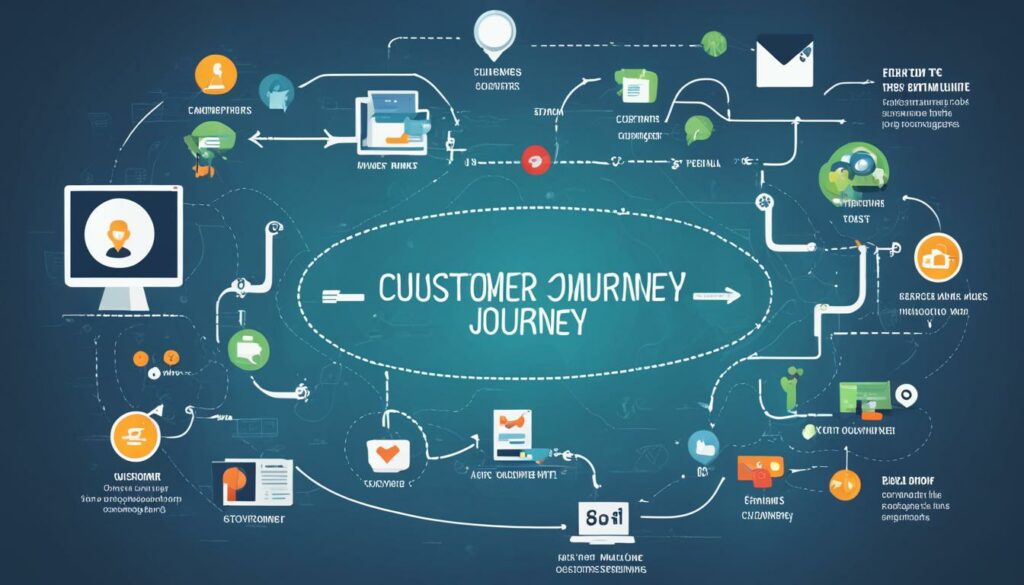Digital marketing in ecommerce refers to the use of various digital channels and strategies to promote and grow an online business. In today’s digital age, having a strong online presence is crucial for the success of ecommerce businesses. By leveraging digital marketing tactics, ecommerce businesses can reach a larger audience, increase online visibility, drive sales, and improve customer engagement.
There are several key strategies that are commonly used in digital marketing for ecommerce. These include social media marketing, content marketing, search engine optimization (SEO), email marketing, and more. Each of these strategies plays a vital role in attracting and retaining customers and driving revenue for ecommerce businesses.
Through social media marketing, businesses can connect with their target audience, build brand awareness, and engage customers through compelling visual content and interactive experiences. Content marketing involves creating and sharing valuable and relevant content to attract and retain customers, ultimately driving conversions and sales. SEO helps ecommerce businesses optimize their website to rank higher in search engine results, increasing online visibility and attracting organic traffic.
Email marketing remains an effective and direct way to reach customers, nurture leads, and drive repeat sales. By strategically implementing these digital marketing strategies, ecommerce businesses can effectively navigate the digital landscape and stay ahead of their competitors.
Key Takeaways:
- Digital marketing in ecommerce is the use of digital channels and strategies to promote and grow an online business.
- It encompasses various tactics such as social media marketing, content marketing, SEO, email marketing, and more.
- Digital marketing in ecommerce allows businesses to reach a wider audience, increase visibility, drive sales, and improve customer engagement.
- By implementing effective digital marketing strategies, ecommerce businesses can optimize their online presence and stay ahead of the competition.
- Key digital marketing techniques for ecommerce include social media advertising, SEO, email marketing, influencer marketing, and content marketing.
The Importance of Digital Marketing in Ecommerce
Digital marketing is a vital component for the success of ecommerce businesses. It enables these businesses to attract and engage potential customers, drive traffic to their websites, and convert leads into sales. In today’s competitive ecommerce industry, having a robust digital marketing strategy is essential for staying relevant and gaining a competitive edge.
By leveraging effective digital marketing techniques, such as search engine optimization (SEO), social media advertising, and email marketing, ecommerce businesses can significantly enhance their online visibility, reach their target audience, and ultimately drive sales. Let’s explore some of the key reasons why digital marketing is so important for the ecommerce sector:
- Increased Online Visibility: Through digital marketing efforts, ecommerce businesses can improve their online presence, making it easier for potential customers to discover their products and services. Using SEO strategies, such as optimizing website content and meta tags, results in higher search engine rankings, driving more organic traffic to the site.
- Targeted Audience Reach: Digital marketing enables businesses to target specific demographics and audiences based on their interests, behaviors, and preferences. By utilizing social media advertising platforms like Facebook Ads or Instagram Ads, ecommerce businesses can reach their ideal customers with tailored messages and promotions.
- Brand Awareness and Trust: Consistent digital marketing efforts help in building brand awareness and establishing credibility in the ecommerce market. By sharing valuable content, engaging with customers on social media, and showcasing customer testimonials, businesses can foster trust and loyalty among their audience.
- Website Traffic and Lead Generation: With effective digital marketing strategies, ecommerce businesses can drive significant traffic to their websites, increasing the chances of lead generation. By optimizing landing pages and implementing conversion rate optimization techniques, businesses can capture and convert website visitors into potential customers.
- Customer Engagement and Relationship Building: Digital marketing allows ecommerce businesses to engage with their customers in real-time. Through email marketing campaigns and personalized communication, businesses can nurture relationships with customers, provide relevant product information, and encourage repeat purchases.

In summary, digital marketing is indispensable for the growth and success of ecommerce businesses. By implementing effective digital marketing strategies, businesses can improve their online visibility, reach their target audience, and ultimately drive sales. In the next section, we will delve into some of the top digital marketing techniques that ecommerce businesses can leverage to optimize their online presence.
Top Digital Marketing Techniques for Ecommerce
When it comes to optimizing ecommerce through digital marketing, there are several top techniques that can significantly increase online visibility and drive business growth. By utilizing these strategies effectively, ecommerce businesses can gain a competitive edge and attract a larger target audience.
Search Engine Optimization (SEO)
One of the most crucial digital marketing techniques for ecommerce is search engine optimization (SEO). By optimizing website content and structure according to search engine algorithms, businesses can improve their organic search rankings and drive qualified traffic to their site. SEO involves keyword research, on-page optimization, technical optimization, and off-page optimization through link building strategies. By focusing on relevant keywords and creating high-quality content, ecommerce businesses can enhance their online visibility and attract organic traffic.
Social Media Advertising
Social media platforms offer valuable advertising opportunities for ecommerce businesses. By leveraging platforms like Facebook, Instagram, and Twitter, businesses can target specific demographics, engage with their audience, and drive traffic to their website. Social media advertising allows businesses to showcase their products or services, create compelling ad campaigns, and retarget potential customers who have already shown an interest. With the right strategies and compelling visuals, social media advertising can significantly increase brand exposure and drive conversions.
Email Marketing
Email marketing remains one of the most effective digital marketing techniques for ecommerce businesses. By building an email list of interested prospects and customers, businesses can nurture relationships, promote new products or offers, and drive repeat purchases. Effective email marketing involves personalized and engaging content, compelling subject lines, and clear calls to action. By segmenting their email list and sending targeted campaigns, businesses can optimize their email marketing efforts and achieve higher conversion rates.
Influencer Marketing
Influencer marketing has become increasingly popular among ecommerce businesses. By collaborating with influencers who have a strong online presence and a relevant audience, businesses can leverage their influence and reach a wider customer base. Influencers can promote products or services through sponsored content, product reviews, and endorsements. This strategy can significantly increase brand awareness, credibility, and drive conversions. However, it’s crucial to choose influencers whose values align with the brand and target audience to ensure authenticity and maximize the impact of influencer partnerships.
Content Marketing
Content marketing plays a vital role in ecommerce digital marketing strategies. By creating valuable and engaging content, businesses can attract and retain customers, build brand authority, and drive organic traffic. Content marketing involves creating blog posts, videos, infographics, and other forms of content that resonate with the target audience. By incorporating relevant keywords and optimizing content for search engines, businesses can enhance their online visibility and position themselves as industry thought leaders. Furthermore, by promoting content through social media and email marketing, businesses can maximize its reach and impact.

In order to optimize ecommerce through digital marketing, it is essential for businesses to leverage these top techniques effectively. By implementing a comprehensive digital marketing strategy that incorporates SEO, social media advertising, email marketing, influencer marketing, and content marketing, ecommerce businesses can increase their online visibility, attract more customers, and drive business growth.
Understanding Customer Behavior in Digital Marketing
Customer behavior plays a vital role in the success of digital marketing in ecommerce. By gaining insights into how customers interact with a website, their preferences, and purchasing behavior, businesses can tailor their marketing strategies to effectively meet customer needs and preferences. Analyzing metrics such as conversion rates, bounce rates, and average session duration provides valuable data that can drive improvements in marketing efforts.
One of the main benefits of understanding customer behavior is its relation to other ecommerce metrics. By examining how customers engage with a website and assessing their behavior patterns, businesses can identify correlations with key performance indicators (KPIs) such as sales, customer satisfaction, and return on investment. This crucial link between customer behavior and other ecommerce metrics enables businesses to optimize their marketing tactics and achieve desired outcomes.
However, it is important to acknowledge the challenges and considerations associated with understanding customer behavior. Data privacy concerns can limit the availability of customer data, making it more challenging to gather accurate insights. Additionally, customer behavior is constantly evolving, influenced by various factors such as technological advancements, changing market trends, and cultural shifts.
Therefore, ecommerce businesses must adapt their digital marketing strategies to address these challenges and considerations effectively.
Challenges in Understanding Customer Behavior
“Understanding customer behavior in the digital landscape poses unique challenges for ecommerce businesses. The rapid evolution of technology, coupled with changing consumer expectations, requires businesses to continuously analyze and adapt their marketing strategies”
One of the key challenges is data privacy concerns. With increased awareness of data security and privacy, customers are becoming more cautious about sharing their personal information. This can restrict the availability of accurate and comprehensive customer data, limiting the insights businesses can gather.
Furthermore, the ever-changing nature of customer behavior patterns poses another challenge. As consumer preferences shift, businesses must stay updated with the latest trends and adapt their marketing strategies accordingly. By monitoring customer behavior data and staying informed about market dynamics, businesses can ensure their strategies remain relevant and effective.
Considerations for Understanding Customer Behavior
- Continuous Research and Analysis: Ecommerce businesses should invest in ongoing research and analysis to gain a deep understanding of their customers. By using analytics tools and conducting surveys, businesses can gather valuable data and insights to improve their understanding of customer behavior.
- Segmentation and Personalization: Segmenting customers based on behavior patterns and personalizing marketing messages can lead to higher engagement and conversions. By tailoring marketing campaigns to specific customer segments, businesses can better address individual needs and preferences.
- Customer Feedback and Engagement: Encouraging customer feedback and actively engaging with customers through social media, emails, and other channels can provide valuable insights into their behavior. This interaction helps build trust, strengthens relationships, and allows businesses to adapt their strategies to meet customer expectations.
By actively addressing these considerations, ecommerce businesses can better understand and leverage customer behavior in their digital marketing efforts.
| Benefits of Understanding Customer Behavior in Digital Marketing | Challenges in Understanding Customer Behavior | Considerations for Understanding Customer Behavior |
|---|---|---|
| – Tailor marketing strategies to meet customer needs and preferences | – Data privacy concerns – Ever-evolving behavior patterns |
– Continuous research and analysis – Segmentation and personalization – Customer feedback and engagement |
| – Optimize marketing tactics and achieve desired outcomes | ||
| – Establish correlations with other ecommerce metrics |

Overcoming Challenges and Considering Best Practices
When it comes to digital marketing in ecommerce, there are both opportunities and challenges to navigate. As businesses embrace the power of digital marketing, they must also address concerns such as data privacy, evolving customer behavior, and fierce competition. To overcome these challenges, ecommerce businesses should prioritize implementing best practices.
Personalization is one such best practice that can greatly impact digital marketing success. By tailoring marketing efforts to individual customers, businesses can create a more personalized and engaging experience that leads to higher conversion rates and customer satisfaction. Additionally, customer segmentation allows businesses to target specific groups with tailored messaging, maximizing the effectiveness of their marketing efforts.
Data-driven decision making is another crucial best practice in digital marketing. By analyzing and leveraging data, businesses can gain valuable insights into customer behavior and preferences. This enables them to make informed decisions about marketing strategies, content creation, and customer experience enhancements. Staying up-to-date with industry trends and regularly optimizing digital marketing strategies is essential to remain competitive in the ever-changing digital landscape.
In conclusion, digital marketing in ecommerce offers immense potential for growth and success. By addressing challenges such as data privacy, adapting to evolving customer behavior, and implementing best practices like personalization and data-driven decision making, businesses can leverage the power of digital marketing to drive their online presence, engage customers, and achieve their goals in the competitive ecommerce industry.
FAQ
What is the role of digital marketing in ecommerce?
Digital marketing in ecommerce refers to the use of various digital channels and strategies to promote and grow an online business. It helps businesses reach a larger audience, increase online visibility, drive sales, and improve customer engagement.
Why is digital marketing important for ecommerce businesses?
Digital marketing is essential for ecommerce businesses as it allows them to attract and engage potential customers, drive traffic to their website, and convert leads into sales. It helps businesses stay relevant and competitive in the ever-growing ecommerce industry.
What are some effective digital marketing techniques for ecommerce?
Some effective digital marketing techniques for ecommerce include search engine optimization (SEO), social media advertising, email marketing, influencer marketing, and content marketing. These techniques help businesses increase their online visibility, reach their target audience, and drive sales.
How does customer behavior impact digital marketing in ecommerce?
Customer behavior is a crucial aspect of digital marketing in ecommerce. Understanding how customers interact with a website, their preferences, and their purchasing behavior helps businesses tailor their marketing strategies to meet customer needs. Analyzing metrics such as conversion rates and average session duration provides insights into customer behavior.
What challenges should ecommerce businesses consider in digital marketing?
Ecommerce businesses should consider challenges such as data privacy concerns, evolving customer behavior, and staying ahead of the competition. Implementing best practices like personalization, customer segmentation, and data-driven decision making can help overcome these challenges and achieve growth.
